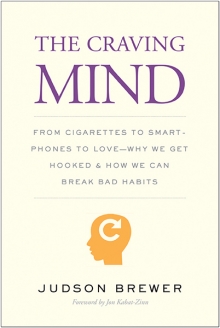(Self-)Righteous Anger
Judson Brewer—
In 2010, I went on a monthlong silent retreat with the aim of working on and possibly stabilizing a special c concentration type of meditation practice (jhana) that can be held for hours if practiced correctly. I had been reading about and trying to develop this practice for the past two years under the wise eye of my teacher, Joseph Goldstein. As with other types of concentration, one needs to set up the conditions that will allow jhanic states to arise. Reportedly, one of these conditions was to remove or temporarily suspend mind states, or “hindrances,” that could get in the way, including pleasant fantasies and anger. This made sense to me. As I had seen on my retreat the previous year, each time I got caught up in either daydreams or angry thoughts, I was, well, caught up in myself and estranged from the object of concentration. Reportedly, jhanic practice was even more sensitive to these hindranc- es. One slight misstep, and one would fall into old habitual patterns and then have to re-create the conditions from scratch.
At the time of my retreat, I had been dealing with some challenges at work. I had a colleague, “Jane,” with whom I was having some dif culty. Details aside (yes, gossip is juicy!), let’s just say I became angry whenever I thought of her. I kept a journal on each retreat, and at the beginning of this particular one, I wrote about Jane daily (often with underlined phrases). Here I was on retreat in a quiet, beautiful setting. All the physical conditions were perfect for me to concentrate. Yet my mental conditions were a mess. Each time a thought of her arose in my mind, I would cycle through endless mental simulations in which I would do this or that, all the while getting angrier and angrier. Of course, because these were my simulations, I was justified in being angry, because of the way Jane had treated me, and the things that she wanted from me, and so on. It would take me forever to climb out of the pit, and even longer to calm down.
This predicament reminded me of one of the passages from the Pali Canon: “Whatever a [person] frequently thinks and ponders upon, that will become the inclination of his mind.”2 As Skinner might have said, anger was now my habit. I was just spinning my wheels, and all the while sinking deeper and deeper in the sand.
On my third day of the retreat, I came up with a word that I would say to myself as a reminder that I was getting caught up and about to fall into the pit, and needed to regain my balance quickly. It was “big.” Big. Big. Big. For me, “big” meant to remember to open my heart big and wide when I started closing down with anger. Soon thereafter, during a walking meditation period, I again got lost in an angry fantasy. This mind state had a very seductive quality to it; anger is described in the Dhammapada, a Buddhist scripture, as having a “poisoned root and honeyed tip.” I asked myself, “What am I getting from this?” What reward had I been giving myself so often that I was constantly in this pit? The answer came in a blaze: nothing! Anger, with its poisoned root and honeyed tip indeed!
This was perhaps the first time that I really saw that getting caught up in self-righteous, self-referential thinking served as its own reward. Like my smokers who realized that smoking really didn’t taste good, I finally saw that my contraction “buzz” from getting all high and mighty with anger was just perpetuating itself. I needed to heed Confucius’s advice: “Before you embark on a journey of revenge, dig two graves.”
Returning to the idea that we learn from rewards and punishments: is it possible that instead of meting out punishments for “bad behavior”—and such consequences would have to be immediate in order to work most effectively—there may be an alternate strategy for success? There may be plenty of punishment in simply seeing the results of our actions: if they cause harm and we see that they do, we will be less excited to repeat them in the future. As I saw with getting caught up in anger while on retreat, we would become disenchanted with harmful actions. Why? Because they hurt. But it is critical that we actually and accurately see what is happening. Mindfulness can be extremely helpful in this regard. We must remove our glass- es of subjective bias, which skew how we interpret what is happening (“hmm, that was fun”), so that we can clearly see everything that results from our behavior. Unless we get that immediate feedback—seeing the consequences of our actions—we may learn something else entirely.
From The Craving Mind by Judson Brewer, published by Yale University Press in 2017. Reproduced with permission.
Further Reading



























